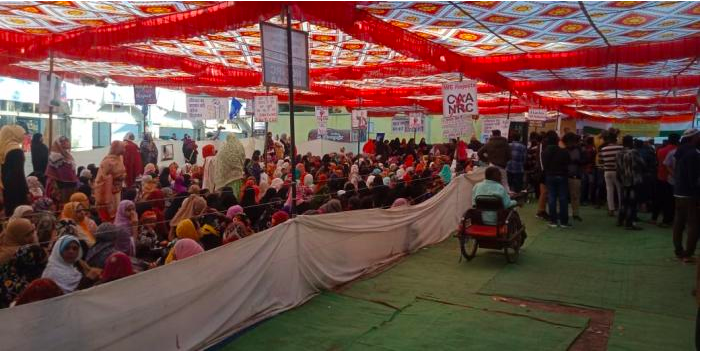Protests For and Against CAA-NRC Overrun Madhya Pradesh

Badwali Chowk, Indore, Madhya Pradesh
Protests against the Citizenship (Amendment) Act (CAA), 2019 and the all-India National Register of Citizenship have intensified across Madhya Pradesh. In Bhopal, the state capital, a 30 square-foot tent set up at Iqbal Maidan, across the road from the Sadar Manzil, a heritage site, has become a temporary home to hundreds of youth, working women and activists of all faiths. They have been on satyagraha here since the government amended the rules for citizenship.
Zamaa Masoor, a school teacher, arrives at the sit-in at around 7 am every day, arranges the mattresses on wooden planks laid on folding beds, the only defence of the protesters against the harsh wintry nights. The mercury dropped to a chilly 6 degrees on most recent days. As she cleans and folds bed sheets, the satyagrahis start waking up to prepare for another day of protest.
“My friend and I spend some time with the satyagrahis and arrange and clean the tent before I go to work in a school,” Masoor says. She returns in the evenings to hear the speeches and songs that condemn the divisive and draconian CAA-NRC law. “They are asking people to give up fear and struggle together,” she says. She holds in her hands a small thali used by a Hindu priest during an all-religions meet held earlier in the morning at Iqbal Maidan.
The members of a local Gurudwara committee bring lunch—chickpea gravy, pooris, rice and chutney for a hundred protesters, which includes several children. The committee members are hesitant to take credit for their generous help. “I assure you, we are not going to click pictures or make videos,” one of the volunteers, who has been on dharna round-the-clock for 18 days, says.
Barely three kilometres from Iqbal Maidan, on Saturday evening, around a hundred, mostly women and youngsters, gathered at Bharat Talkies Square in the old city, despite prohibitory orders. At both these sites of protest, there are no real leaders.
In the state’s commercial capital, Indore, the police baton-charged protesters to disperse them from Barwali Chowki. Yet, the protest entered its fourth day. After the police used batons against citizens, the district administration sent an Additional Superintendent of Police and a Station House Officer to the police lines, a common form of reprimand, on Friday.
Over the last one week or so, many individuals and groups have prepared posters and supplied food to the demonstrators, as a way to express their support and solidarity. There are protests ongoing in Sagar, Umariya, Raisen, Dewas and Neemuch districts.
In Neemuch and around, citizens have displayed great courage in defying the Central diktat; but always peacefully. They have set an example of satyagraha, in line with Mahatma Gandhi’s Civil Disobedience Movement. A large number of Muslims have pledged not to show their identity papers (Aadhaar cards) to government officials. They have to show these cards in order to access food rations from the government. The weaker sections of society are, therefore, sacrificing their food security in the interest of defending citizen’s rights.
As the protests intensify, the workers of Madhya Pradesh’s main Opposition party, the Bharatiya Janata Party, which is ruling at the the Centre, is holding demonstrations in support of the CAA. On 12 January, Union Home Minister Amit Shah addressed a gathering at the Garrison Grounds of Jabalpur, as part of what the BJP has been calling a campaign to generate awareness about the CAA.
The government says the “awareness campaign” are meant to contain the “misinformation” surrounding CAA and NRC. The Home Minister has been asserting that his government will not rest until citizenship is granted to members of the six minority religions from the three neighbouring countries. The countrywide NRC is also a part of the BJP’s political arsenal; however, its leaders have lately sought to draw attention only towards the CAA.
Volunteers of BJP have been holding demonstrations supporting CAA in Mandsaur as well—the site of unprecedented farmer unrest a couple of years ago. Yet, several Muslim leaders have quit the BJP after expressing strong resentment over the amended law, and the NRC in particular. Some 50 office-bearers of the party have also resigned in Bhopal, Khandwa and Khargone, as has the party spokesperson, minority-cell secretary, Akram Khan. The party has expelled its own state minority cell spokesperson, Javed Baig, after the mass exit of Muslim leaders. Whether this amounts to a further political weakening of the BJP in the state is another matter.
The pro-CAA protests led by the BJP, considering it is the ruling party at the Centre, is ironic. On the other hand, the anti-CAA protests lack a defined leadership. Both sides of this rift have been making themselves felt in the state, though in very different ways. On Sunday, a BJP supporter allegedly assaulted Priya Verma, the Deputy Collector of Rajgarh district, after officials allegedly struck BJP workers who were protesting despite prohibitory orders.
The amended CAA seeks to grant Indian citizenship to minorities from the three Muslim-majority neighbouring countries, Pakistan, Afghanistan and Bangladesh.
Muslims fear that the combined effect of the CAA and the NRC will be to deny them citizenship. While the NRC may exclude, on the basis of documentary proof, people of any religion from the list of citizens, the Muslims will not have the option to claim being refugees from neighbouring countries—as the CAA does not make room for minorities. The Hindus, especially those who belong to weaker sections, also fear exclusion and political isolation due to the combined effects of CAA and NRC. They, too, often do not have the requisite documentation and finances to undertake the cumbersome verification of citizenship across generations.
For these reasons, ever since this law was passed, millions of people from Assam to Maharashtra, Punjab to Puducherry, have defied prohibitory orders to assemble against the CAA-NRC despite a police crackdown, in which more than 27 people have been killed, at least 23 of them only in the northern state of Uttar Pradesh.
Aurangzeb, a mechanical engineer, who walks using crutches that are wedged under both his shoulders, walks to Iqbal Maidan and Bharat Talkies, devoting all his time to engage with others who oppose the law and the NRC.
“I ask new people joining the protest what they known about CAA and NRC,” says he. He tries to explain exactly how the two policies work and why they will harm every citizen. “I had never imagined that these protests would draw so much support,” he says.
The writer is a freelance journalist based in Bhopal.
Get the latest reports & analysis with people's perspective on Protests, movements & deep analytical videos, discussions of the current affairs in your Telegram app. Subscribe to NewsClick's Telegram channel & get Real-Time updates on stories, as they get published on our website.























